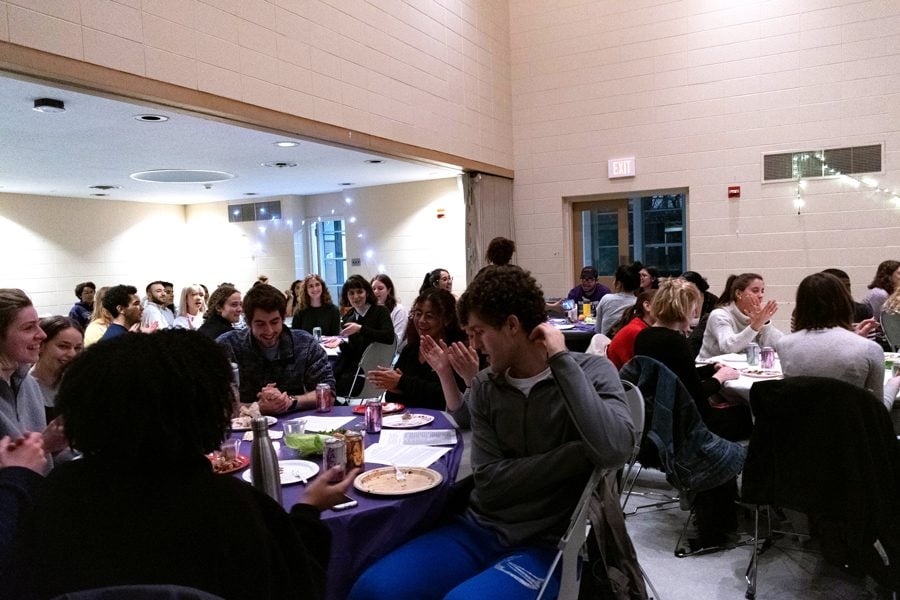Student coalition revives Freedom Seder after five-year hiatus
Alison Albelda/Daily Senior Staffer
Over 100 students attended Northwestern’s Freedom Seder, the first since 2014. The event discussed several topics including the similarities between Jewish, Palestinian and black struggles.
April 30, 2019
Interspersed with songs, prose and allegories to the struggles of the Jewish, black and Palestinian communities, Monday marked the first Freedom Seder since 2014.
The Freedom Seder is a ceremony with a 50-year history whose goal is to connect the liberation struggles of various disadvantaged communities and discuss ways to achieve freedom for all, said Jessica Schwalb, a co-organizer of the event and a former Daily staffer.
Parkes Hall was filled with over 100 students of various groups and backgrounds. Organizers represented several campus organizations including the Seder’s three co-sponsors: the Jewish Progressive Alliance, For Members Only and Students for Justice in Palestine, as well as members of JStreet U and Alianza.
At the center of every table in the room was a plate adorned with several fruits and vegetables that represented different oppressed peoples. An orange in the center represented solidarity with the LGBTQ+ Jewish community and others who are marginalized in the Jewish community. Beside it was an olive, which symbolizes the olive trees that are torn down due to “Israel’s occupation of the Palestinians,” according to Weinberg sophomore Jihad Esmail. Yams finished the plate, being used to show both the horrors of the slave trade and the resilience of the African peoples.
Esmail, member of SJP and a co-organizer of the event, said including Palestinians in the ceremony was an “amazing” opportunity that benefited campus discourse. The Seder was a way to reframe these individual struggles for freedom as one single fight for liberation, he said.
“It’s one thing to acknowledge and respect the struggles of others,” Esmail said. “To understand what others are going through (and) understand what liberation means for others is another thing. Our goal in this event was to understand that collective liberation is not just about the respect of other people’s liberation, it’s about understanding that it is one liberation. It is one mission and is one goal, and we’re all in it together.”
Throughout the event, the room would burst out into singing “songs of resilience” like “This Little Light of Mine” and traditional Seder melodies like “Dayenu.”
The audience discussed more serious topics as well. At one point during the ceremony, people were asked to examine the Biblical Ten Plagues as well as several alternative plagues such as The Ten Plagues of the Occupation and the Ten Plagues of Racism and Colonialism. They were then asked to examine the other side of liberation, those who are affected when enslaved people become free, and afterwards instructed to make their own list of plagues that affect struggles seen in society today.
Northwestern’s Freedom Seders started in 2003 and continued until 2014 as partnership between Northwestern Hillel and FMO, but ceased after a contentious ASG vote deciding to divest funds from organizations that sold weapons to Israel that would be used in Palestine.
Since then, Hillel has independently hosted smaller Seders touching on themes that would have normally been discussed in a Freedom Seder, like reparations and the refugee crisis. This year, Hillel was not a co-sponsor of the Freedom Seder.
Michael Simon, executive director of Hillel, said although Hillel was involved in the early planning process of the Seder, a disagreement had occurred regarding other groups getting involved with the organization of the event.
“In terms of the Freedom Seder, we’re glad that there will be many students who are involved in Hillel who are excited about the themes of the Freedom Seder,” Simon said before the event. “We hope that what happens (Monday) is a really meaningful experience for all of them and for the broader campus community.”
Schwalb said Hillel not officially co-sponsoring the Seder made her “really sad” and she hopes in the future “that Hillel will choose to be part of events like this.”
SESP senior Jessica Saffold, a co-organizer of the Seder, had wanted to see the Seder return since her freshman year, and she was happy that the event finally “came to fruition.”
“For us, community building was really important because we felt that there wasn’t really a space where black students and Jewish students and Palestinian students — communities that people try to say that they are at odds with each other and that their liberation is contradictory — we really thought there wasn’t a space where we could talk about the ways in which those three communities could come together,” Saffold said.
Twitter: @awstinbenavides
Email: austinbenavides2022@u.northwestern.edu


